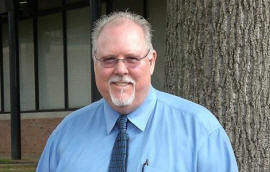|
 Humanism
and loss of Absolutes Humanism
and loss of Absolutes
By Jim Killebrew
 Send a link to a friend
Send a link to a friend
[February 11, 2015]
Humanism
is "a system of thought that is based on the values,
characteristics, and behavior that are believed to be best in human
beings, rather than on any supernatural authority." (Encarta
Dictionary) In an effort to eradicate any form of spiritual thought
based on the Christian values found in the Bible, much of the
American educational system has based curriculum more on humanistic
theory and evolutionary theory. It has been evident over the past
decades the educational system is humanistic and has been so for at
least the past 75 years. Perhaps the greatest influence on the
modern thought began with the destruction of the Absolute. |
 Georg Wilhelm Friedrich Hegel is
studied in universities around
the world. He was a German
philosopher who looked at the
paradigm of absolute Truth in
the model of relativity. He
described an idea (thesis) as
being affected by the
"antithesis" of that idea or
belief, that eventually evolved
into a "synthesis." From that it
became a new idea or belief. Of
course this is oversimplified
and understated, but the
paradigm shift proposed by Hegel
was significant. It represented
a shift from the Absolute Truth
to a relative truth that was
situational at best.

The current, post modern,
educational system in America is
steeped in the Hegelian thought,
as is our very public domain.
Everyone who has graduated from
high school from the early
1960's on has been under the
influence of defining truth with
a little "t". It is ingrained in
our political, social, economic,
public and private lives.
Generations have been tutored in
humanistic thought and the
destruction of Absolutes. It
carved out the thoughts of
Fletcher, who brought us
"Situational Ethics" where the
environment, or situation
details the morality of the
behavior. My grandchildren think
I am ancient because I can say I
lived before the internet. For
them to believe when they become
teenagers or young adults that
there is anything that relates
to an "Absolute" will only exist
in what they think of as
"science." For that generation
we are beyond post modernism.
[to top of second column] |

It is interesting to listen to the
debate running around the political
and educational circles currently
regarding Common Core. Coming from
the top down from the government to
have a national standard around
which the teacher must teach and the
student must learn, one wonders what
the final outcome of such a system
might be. It is almost impossible to
dispute the large, federal
government's power and influence in
everything it touches. Indeed, when
an entity has the power of making
and enforcing laws that mandate
behaviors from the people governed,
it is not difficult to see how the
influence of the government will not
just be "relative" in the strictest
sense of that concept, but
"absolute" in its ability to insist
that everyone be compliant with the
national standards. That is evident
in the incremental change that
always occurs when the federal
government initiates a gigantic
program. The big stick the federal
government carries is the funding,
and the withholding of that funding.
Text book writers will eventually
follow the national standards of
Common Core, teachers will teach the
content of that source and students
will be required to meet those
standards in order to progress in
their education.
Modern education, with the liberal
guidance through national standards
from the federal government, science
and even our own posterity will
eventually not see any need for
discovery since they will have lived
their lives like the little hamster
in the small, clear ball in which he
uses to roll around the room.
Eventually that will be their
universe.
[By JIM KILLEBREW]
Click here to respond to the editor about
this article.
|